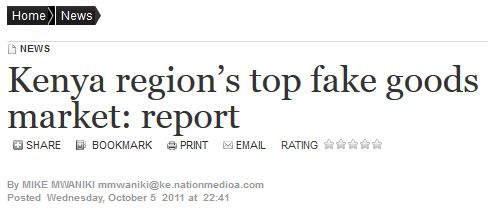Kenya is the biggest market for counterfeit goods and contraband in East Africa, says a new report.
The counterfeit industry, according to Termites at Work: A report on Transnational Organised Crime and State Erosion in Kenya, is worth Sh70 billion and rivals key foreign exchange earners tourism, tea and coffee.
The industry thrives because Kenya is the biggest economy in the region and goods move fast.
The report, launched in Nairobi this week at a policy forum co-hosted by the International Peace Institute and Africa Centre for Open Governance, says China and India are the key sources of counterfeit goods in the East African region.
“The Kenya Association of Manufacturers — whose members are directly affected by trade in counterfeit goods — has estimated that manufacturers incur an annual loss of Sh30 billion,” the report says.
Corruption, weak administrative as well as legal regimes and disparate tax systems (excise and import duties) in the East African Community contribute significantly to the flow of contraband.
“Counterfeit goods available in Kenya are either manufactured in backstreet factories or simply smuggled from Asia and the Middle East…
“Imports are often earmarked as transit goods to destinations in Uganda, Democratic Republic of Congo, Rwanda, Burundi or Tanzania but are diverted to destinations within Kenya…
“Locally produced, inferior counterfeit goods are exported but then smuggled back to avoid paying taxes,” the report says.
The Kenya National Chamber of Commerce and Industry says smugglers target fast moving and highly-profitable goods like sugar, vehicles, electronics, pharmaceuticals, cigarettes, batteries, pens and cosmetics.
“At the border, the import documents are stamped to indicate goods have crossed the border, but in fact the goods are smuggled back into the country,” it says.
Public discussion about the massive illicit economy is muted because of the power and patronage wielded by the people involved in the business in East Africa, some highly placed in government.
The report says President Kibaki has encouraged open debate on the problem: “Illicit trade is a big problem in all the five member states of the East African Community; therefore we cannot pretend that we are not aware of this problem, it is now upon us to find a solution to it,” it quotes him saying.
The long, porous borders that Kenya shares with Somalia, Uganda and Tanzania (across Lake Victoria) provide low-risk opportunities for counterfeit smugglers and those engaged in illicit trade.
“Smuggling takes place by sea, across Lake Victoria and through inland exit points,” says the report.
The most frequently used smuggling points in Kenya are the coastal settlements of Vanga, Lunga Lunga, Ghala Island, Kinondo, Gazi, Bodo, Majoreni, Mokowe, Lamu, Takaungu, Kipini, Kiunga, Kiwayu and Mombasa Old Port.
The report also identifies Eldoret International Airport as notorious for the smuggling and trafficking of illicit goods.
“This airport, which has been temporarily closed by Kenyan authorities on two occasions when smuggling activities became too brazen, is a well-known entry point for counterfeit medicines, watches and textile products flown in from the Middle East and involving criminal networks with links to many countries outside Kenya,” it says.
